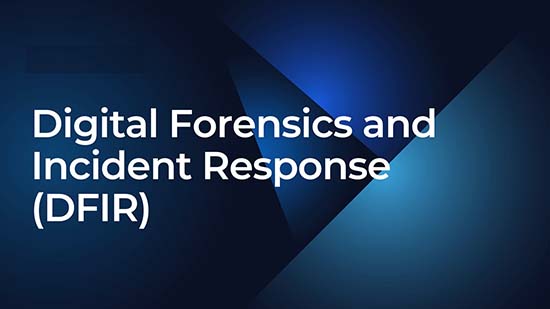Digital Forensics (DF) is the practice of gathering and analyzing evidence to detect cyber attackers. This data may then be used against hackers and prevent future incidents. Experienced teams must possess all of the tools and processes required for effective DFIR work to be quick in responding quickly and accurately.
What is Digital Forensics?
Digital forensics, commonly called computer forensics, involves recovering, examining, and analyzing material found during cybercrimes. Although originally applied only to PCs and laptops, digital forensics now encompasses any device with digital data storage, such as tablets, computers, mobile phones, game consoles, virtual home assistants and Amazon Echo-style virtual home assistants.

Digital forensic experts hunt for evidence that will enable them to reconstruct what happened and who was involved, similar to physical crime scene investigations. The process includes locating the crime scene, seizing and preserving evidence so it won't vanish or get altered, and then analyzing this material to understand what occurred.
As cybersecurity incidents increase, large companies must employ their forensics departments to understand what was compromised and why. Law enforcement agencies must also remain aware of new trends in hacking.
Digital forensics specialists perform their duties by inspecting raw data and system memory, such as the operating system cache, for signs of any malicious code that might have infiltrated a system and the impact of said malware infection on that system. Furthermore, they will review email logs, SMS/MMS messages logs, and any other relevant records to identify potential intrusion attempts or any relevant details that can provide more insight.
Before recently, specialized tools for digital forensics were limited, and investigators often relied on existing system administrator tools to extract data for investigation purposes. Unfortunately, this practice often led to evidence being altered or deleted accidentally - prompting demand for dedicated digital forensics software solutions.
Forensic software enables professionals to securely retrieve electronically stored information (ESI) from various devices and verify its chain of custody from crime scenes through analysis and reporting phases. This crucial element of an investigation ensures no evidence tampering occurs and that its authenticity can be accepted in court; indeed, digital forensics' credibility must depend on this evidence being accepted as a legitimate scientific discipline.
What is Incident Response?
Digital forensics is an investigative branch of computer science that utilizes digital evidence to provide details about what occurred on any system, device or network. It can be applied in legal matters such as litigations, regulatory inquiries, internal company incidents, or criminal activity. In contrast, incident response applies digital forensics principles to respond to cybersecurity threats.
Teams work to investigate cyber attacks by analyzing data from computer systems. This involves gathering evidence such as running memory, log files and network connections to establish what type of cyber attack occurred and its nature. Reverse engineering malware may be required to understand its usage and potential effects on an organization.
Once the team understands what has occurred and its cause, they can start taking steps to contain and prevent future incidents from reoccurring. This may involve temporarily shutting down systems or using tools like SIEMs and EDRs to identify threat actors quickly; wiping and rebuilding impacted devices; updating operating systems; or changing passwords to reduce future attacks.
Another key element of this step is conducting an in-depth review of what worked well and what didn't when implementing their incident response plan (IRP). Making changes for improvements before another attack occurs is essential.
As part of an incident response plan (IRP), having IRP templates ready is also useful; these standardized steps help address common scenarios during an incident and reduce both time and resource requirements for individual events.
As part of any DFIR team, the right people must be included. This may include IT personnel, security analysts, threat researchers and members from functional areas like legal, human resources and corporate communications, which might become involved if a severe attack reverberates widely. Strong communication skills are an absolute must because DFIR requires delegating tasks while cooperating closely with others on solving them.
What are the Skills Needed to be a Digital Forensics Expert?
Digital forensics specialists must possess an array of abilities, from strong analytical thinking and in-depth knowledge of technology to meeting industry standards when imaging, preserving, transporting or handling electronic devices or data. Furthermore, you must be capable of properly documenting evidence that comes your way.
Due to the increasing rates of cybercrime, digital forensics experts are an invaluable asset to law enforcement and businesses. Serving as first responders, data analysts, expert witnesses, and digital forensics specialists are responsible for identifying, investigating and assessing online crimes that take place - which ultimately helps in solving crimes and convicting criminals.
Are You Thinking About Becoming a Digital Forensic Expert? For those interested in becoming digital forensics experts, higher education is often the key to developing their necessary skills. A bachelor's degree in forensic science, computer science or criminal justice would be helpful when starting; having relevant work experience may also prove useful; many companies provide internships or part-time work experiences to those starting; this type of learning experience provides excellent opportunities to acquire these essential abilities while earning income and building work experience simultaneously.
Digital Forensics experts require an undergraduate degree and the right certifications to become effective digital forensics professionals. Reputable certification organizations such as Global Information Assurance Certification, International Association of Computer Investigative Specialists and AccessData offer courses and certificates to those looking to enter this profession. At the same time, many employers also cover tuition reimbursement programs to make this cost-cutting path possible.
As a digital forensics professional, one key skill you should possess is being up-to-date on new technology in cybersecurity. Malware and viruses emerge daily, making it essential that digital forensics specialists stay current with the latest tools and techniques by attending conferences, reading publications or taking digital forensics courses.
Digital forensics is a fundamental component of incident response, yet it's essential not to confuse its two roles. The incident response aims to minimize the effect of an attack while increasing resilience against future attacks. At the same time, digital forensics provides evidence of what caused an incident, restores deleted files or proves misuse of company assets.
What is the Role of a Digital Forensics Expert?
Digital forensics specialists investigate electronic devices, software applications and networks for evidence of crimes such as financial fraud. By gathering data captured from these systems to detect patterns of fraudulent behaviour and help law enforcement and prosecutors bring those responsible to justice, digital forensics experts employ industry best practices when imaging, preserving, transporting or handling electronic data and associated physical devices during their investigation processes.
Digital forensics specialists also assist businesses that have experienced cyber breaches or attacks by helping recover lost data and identify malicious activity. Incident response teams typically perform this work and can include:
- Investigating hard drives for evidence of data breaches.
- Identifying malware or other potential culprits responsible for damages caused to systems.
- Mitigating damage caused by these activities.
- Restoring any overwritten files to make systems functional again.
Digital forensics is increasingly used in civil cases, such as divorce proceedings and child custody battles, investigations of accidents, missing persons and wrongful deaths - and nearly every legal case today involves computer hardware or software as part of its evidence, networks or mobile devices that need examining. Digital forensics experts have become necessary in modern legal investigations involving computers or networks or mobile devices requiring investigation.
Digital Forensics can offer many avenues of professional advancement for those who wish to become experts. A master's degree in information technology or cybersecurity may be an option. However, IT and security experience alone could still lead to becoming an expert digital forensics practitioner through professional training and certification programs.
Expert witnesses in digital forensics are becoming more in demand due to increased cases involving cybercrime and incidents with significant digital elements in court proceedings. These experts can testify as expert witnesses on findings from investigations they conducted and the validity of digital evidence presented before courts; furthermore, they provide advice and guidance to other professionals or organizations facing similar circumstances who need guidance in responding appropriately to similar situations.
